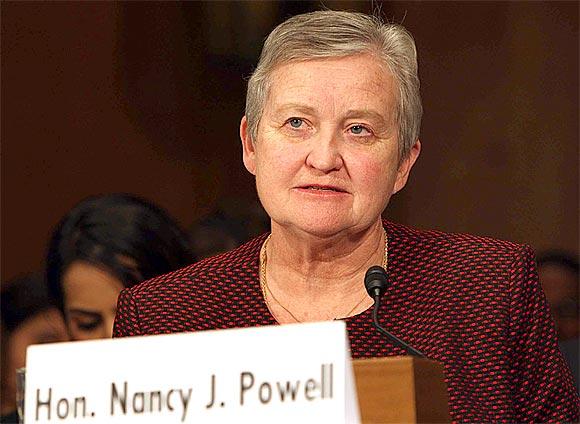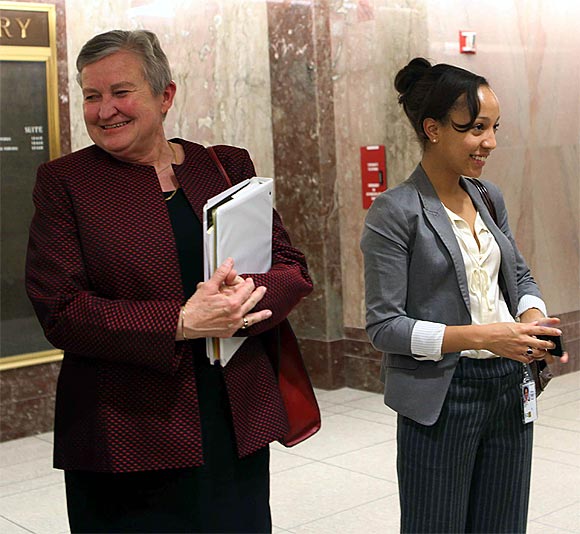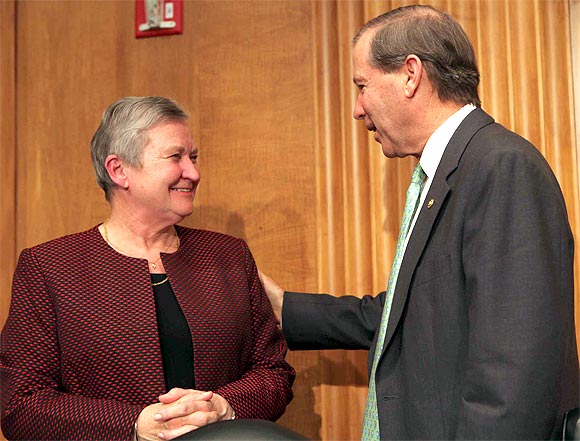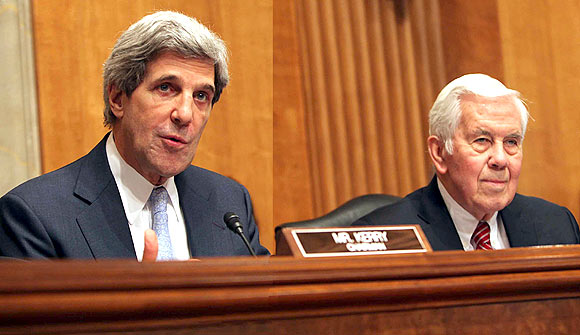 | « Back to article | Print this article |
The US ambassador designate's India plan
Nancy Powell's pledges to cement US-India strategic partnership. Aziz Haniffa reports
Career diplomat Nancy J Powell, President Barack Obama's nominee to be next United States ambassador to India, has pledged to endeavour to cement the US-India strategic partnership, if confirmed by the Senate.
Appearing before the Senate Foreign Relations Committee, Powell -- a former ambassador to Pakistan and Nepal -- spoke nostalgically about her assignments in Kolkata, where she was the consul general, and New Delhi, where she was a political officer, during the early and mid-90s.
For Rediff Realtime News click here
She said she was witness to the dramatic economic transformation that was taking place, when the Nehruvian economic policies were dumped for open market reforms, which has today made India a global economic power, and added, "Today I see an India that has catapulted itself onto the global stage. India is becoming an economic powerhouse, having averaged seven per cent annual economic growth over the last decade, lifting tens of millions of its citizens out of poverty. India will also be a leading security partner of the United States in the 21st century."
Click NEXT to read further...
Read: Powell put on mat in Congressional hearing over India's Iran ties
The US ambassador designate's India plan
Powell said, "The number and kinds of interactions between our two countries at all levels is staggering in its breadth and depth. At its heart are the people-to-people links -- students, businesses and tourists -- along with the 3 million-strong Indian-American community. At the government-to-government level, our relations are firmly grounded in a set of shared democratic values and an increasingly shared strategic vision of both the opportunities that can promote those values as well as the threats that can undermine them."
She said her top priorities would be bolstering trade and investment.
"We've made unprecedented progress in expending our economic relations with India -- our bilateral goods and services trade will top over $100 billion in 2012. This represents an astounding quadrupling of trade since 2000, moving India up from our 25th largest trading partner to our 12th," she added.
"I look forward to working with the interagency team and with our Indian counterparts to reduce barriers, including through the negotiation of a bilateral investment treaty and to expand the areas where we do business."
The US ambassador designate's India plan
Outlining defence cooperation, "which currently is at an all-time high," as another priority, the ambassador designate said, "US defence sales to India reached nearly $8 billion last year, and India holds more military exercises with the United States than with any other country. As stated in the national security strategy, we see India as a net security provider in the Indo-Pacific region. As India continues to modernise its armed forces, there are additional opportunities for us to expand our cooperation across all the services and at all levels."
Powell said she would also work to enhance US-India cooperation in international and multilateral fora; encourage India's leadership and cooperation across the Asia-Pacific; and increase cooperation on counterterrorism and global threats, nonproliferation and nuclear security.
She said, "Another priority will be encouraging India's role in supporting peace and stability in the Indian Ocean region. India and the United States share a common interest in supporting continued efforts to establish a peaceful, prosperous and democratic Indian Ocean region."
The US ambassador designate's India plan
During the question and answer session, Senator Jim Webb, Virginia-Democrat, brought up the glaring inequalities in India, "Some of the most wealthy entrepreneurs in the world are in India. Those who have come to this country from India do extremely well. And yet, if you look at the world fact book, the per capita income in India is about $800, at least the one that I just looked at, in the Economist World Fact Book, which is less than $3 a day."
Powell attributed this to the "enormous societal inequalities based on historic caste systems of economic differences," but added, "I contrast my earlier time in India where they were just emerging from a very, very closed economic system, one which required enormous amounts of work to start a business -- or to close one for that matter -- with the current system. It's not perfect yet; it still takes a long time in India. It's still not a red-tape-free society, but all those things are freeing up India. We have seen over the 20 years of economic reforms a tremendous number of people who have been removed from absolute poverty."
Senator Tom Udall, New Mexico Democrat, asked Powel if the US could have a more proactive role in easing the "friction between India and Pakistan."
She said, the US "plays a role in encouraging ideas and looking for additional creative solutions," but "the primary responsibility rests with the two countries. Having worked with so many of their leaders and their diplomats, I'm very confident that they have the ability to do that, but certainly don't rule out our ability to assist."




